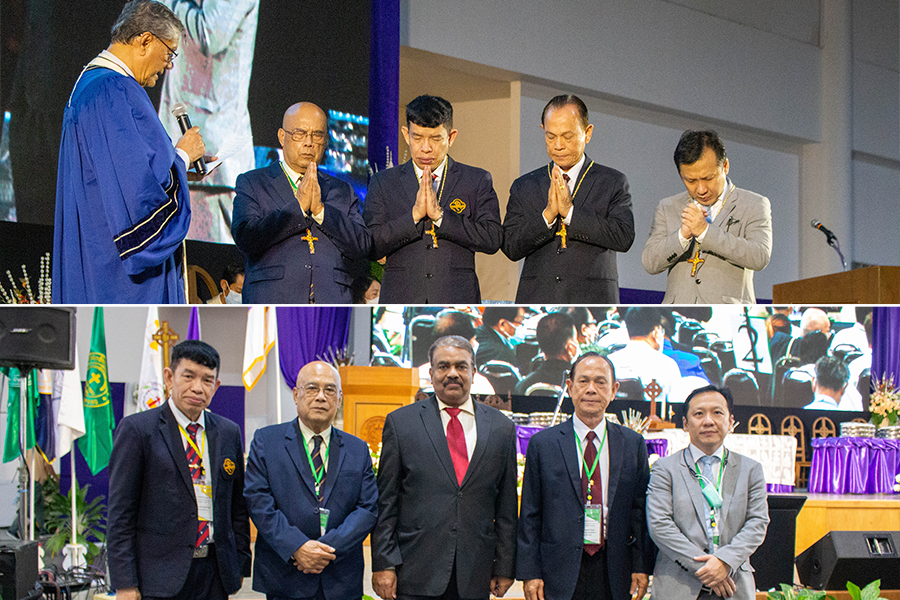CCA congratulates new leadership team of Church of Christ in Thailand
 1. Dr Sint Kimachandra officiating the installation service of the new CCT Officers; 2. CCA General Secretary (middle) with the new Officers of the CCT: from left; Rev. Pongsak Sintumud (Vice Moderator), Rev. Dr Boonratna Bauyen (Moderator), Surapong Mitrakul (General Secretary), and Visal Mahachavaroj (Treasurer)
1. Dr Sint Kimachandra officiating the installation service of the new CCT Officers; 2. CCA General Secretary (middle) with the new Officers of the CCT: from left; Rev. Pongsak Sintumud (Vice Moderator), Rev. Dr Boonratna Bauyen (Moderator), Surapong Mitrakul (General Secretary), and Visal Mahachavaroj (Treasurer)
Chiang Mai: The Church of Christ in Thailand (CCT) elected a new leadership team for the period 2023 to 2026 at its Biennial General Assembly, held at the Payap University Campus from 18 to 21 October 2022.
Rev. Dr Boonratna Bauyen (Moderator), Rev. Pongsak Sintumud (Vice Moderator), Surapong Mitrakul (General Secretary), and Visal Mahachavaroj (Treasurer) are the newly elected officers of CCT.
The Christian Conference of Asia (CCA) General Secretary, Dr Mathews George Chunakara, congratulated the newly elected leaders of CCT who will lead this member church of the CCA in Thailand for the next quadrennium, starting from 1 January 2023.
“May God bless you as you undertake your great tasks. CCA will continue to work with you, the newly elected leaders of CCT, when you continue to be engaged in manifold ministries," the CCA General Secretary told the new officers at their installation on 21 October.
The new leaders of the CCT come from diverse professional backgrounds with rich experiences.
Rev. Dr Boonratna Bauyen, a well-known preacher, theological educator, and author of several books, served previously also as the Moderator and General Secretary of CCT.
“Boonrat” is a household name among CCT members across the country, and he served the CCT in various capacities during the past several decades. He was Dean of the McGivalry College of Divinity of the Payap University as well as Vice-President of the Payap University and President of its Board of Trustees.
Surapong Mitrakul, a lawyer by profession, is a lay leader of the CCT and comes from Southern Thailand. He has now been elected to a second term. He served as General Secretary of CCT from 2015 to 2018. He is also known for his contribution to the area of education.
The CCT represents over half of the Protestant Christian community in Thailand and has done extensive work in the field of evangelism, education, health care, social development, and Diakonia. The church runs two universities, thirty schools, two theological seminaries, seven hospitals, a rehabilitation institution for leprosy patients and other physically disadvantaged persons, and a ministry among the elderly. Social development work is carried out among ethnic hill tribes, refugees, and HIV and AIDS-affected people.










